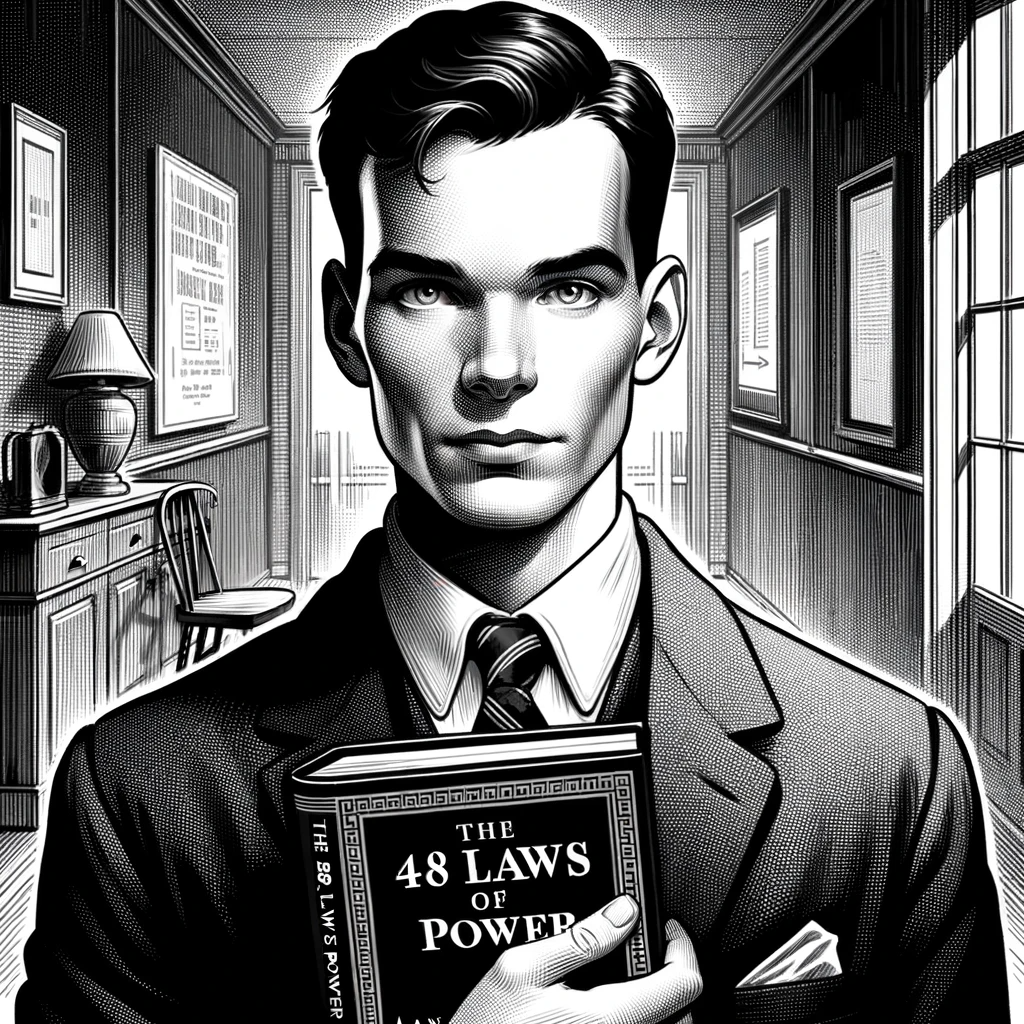Alan Turing and The 48 Laws of Power
Decoding the life of a genius through Robert Greene's unforgiving lens.

What can the life of Alan Turing—a visionary mathematician, and the architect of modern computing—teach us about navigating the complex dynamics of power, influence, and success, especially in a world that is often unkind to those who diverge from the norm? Using Robert Greene's "48 Laws of Power" as a prism, we dissect Turing's multifaceted life to unveil timeless lessons about the interaction between groundbreaking accomplishments and societal norms that can alternately uplift and devastate a career.
It's important to note that I am not suggesting Turing consciously adhered to these laws. Rather, my aim is to gain insights into the interplay between his groundbreaking accomplishments–like cracking the Enigma code during WWII and laying the foundations for modern computing–and the societal norms that both elevated, and tragically truncated his career.
Turing's Triumphs.
Mastering the laws of power.

Drawing the World to Bletchley Park
Law 6: Court attention at all costs.
Alan Turing was far more than a mathematical prodigy; he was an intellectual vortex that irresistibly attracted unparalleled talent and resources to Bletchley Park. In alignment with Robert Greene's Law 6, Turing didn't just court attention—he commanded it through the sheer gravity of his contributions to the Allied war effort, thereby transforming Bletchley Park into the beating heart of wartime cryptography.
Robert Greene's sixth Law of Power warns against the perils of obscurity. To gain influence and achieve success, one must command attention. Commanding attention is vital, and Turing did so not through flamboyance, but through the intellectual prowess and the impact of his work.
Turing courted attention through the sheer weight of his intellectual contributions. His innovative work on decrypting the German Enigma code was not just a brilliant display of technical skill; it was a strategic masterstroke that made him indispensable to the war effort.
As a result of his undeniable impact, Turing attracted a cohort of brilliant minds to Bletchley Park. This included linguists, chess champions, and fellow mathematicians. Recognizing the significance of his work, the British government allocated substantial resources to Bletchley Park, further cementing its status as a hub of technological and cryptographic innovation.
Alan Turing's role at Bletchley Park exemplifies the power of courting attention through indispensability and exceptional skill. By becoming the focal point around which both talent and resources gravitated, Turing turned Bletchley Park into the epicenter of cryptographic excellence, thereby accelerating the Allied forces' path to victory in World War II.

A Man of Many Talents
Law 25: Re-Create Yourself
Alan Turing defied categorization. From mathematical logic to cryptanalysis and artificial intelligence, his polymathic pursuits make him the embodiment of Greene's Law 25. He didn't just adapt; he reinvented himself repeatedly, affecting seismic shifts in multiple disciplines and leaving an indelible mark on humanity’s intellectual landscape.
Robert Greene's Law 25 emphasizes the power of adaptability and reinvention in carving out a path of influence and opportunity. Turing's life serves as a case study in how this law can manifest in various forms.
Let's explore the different realms Turing ventured into, each time leaving an indelible mark:
- Mathematical Logic: Turing gained initial acclaim in the world of mathematical logic. His seminal work on the Entscheidungsproblem and the conceptual introduction of the Turing machine provided the cornerstone for theoretical computer science.
- Cryptanalysis: During World War II, Turing's importance escalated exponentially. Recruited by the British Government Code and Cypher School, his role in deciphering the German Enigma code was monumental. The impact of his work extended beyond academia; it shortened the war and saved lives.
- Computer Science and AI: Turing's intellectual journey didn't end with the war. He continued to innovate, this time focusing on what would become modern computer science and artificial intelligence.
- Influence and Opportunities: Across these fields, Turing's adaptability was evident. He engaged in both theoretical and applied research, collaborated with various institutions, and influenced successive generations of researchers and technologists.
Alan Turing's ability for reinvention wasn't merely incidental; it was a defining characteristic of his genius. By continually adapting and expanding his intellectual pursuits, he gained significant influence and opened up new avenues for impact, fully embodying the essence of Law 25: "Re-Create Yourself."
Turing's Downfall.
Ignoring the laws at his peril.
Transgressing Laws 38 and 19
Think as You Like, But Behave Like Others & Know Who You're Dealing With—Do Not Offend the Wrong Person
Alan Turing’s 1952 conviction for "gross indecency" serves as a grim reminder of the delicate balance between individual authenticity and societal norms. Though his conviction was a grave injustice, it highlights the risk of underestimating the prejudices of the society one inhabits, even when you've reached towering heights of accomplishment.
Both of these laws stress the importance of navigating the delicate balance between personal convictions and societal norms. Law 38, in particular, suggests a nuanced approach: uphold your own beliefs but adapt your behavior to the prevailing societal climate. Turing's conviction is of course an absolute miscarriage of justice. An immoral and nonsensical punishment of a beautiful mind, and all this despite his monumental contributions to society and humanity at large.
Turing was, by many measures, a national hero, especially for his role in World War II. Despite this, his accomplishments could not shield him from the prejudices of post-war Britain—a society that was not amenable to the open expression of diverse sexual orientations. Turing's ensuing arrest, conviction, and the barbaric sentence of chemical castration that led to his premature death were not merely the outcomes of his actions, but a consequence of a society that had yet to evolve its understanding and acceptance of homosexuality.
While Turing's intellectual valor and groundbreaking contributions stood as testament to his exceptional character, they could not protect him from the harsh penalties imposed by a society operating under skewed moral and ethical norms. His life’s tragic end serves as a poignant reminder of the severe consequences that can arise when one's personal truths come into conflict with outdated and unjust societal norms.
Breaking Codes but Not Prejudices.
The limits of intellectual might.
Alan Turing's life offers a sobering lesson that brilliance and contributions to humanity do not inoculate one against the prejudices of the day. Turing's end reminds us that the power dynamics embedded in societal norms can sometimes tragically outweigh even the most remarkable individual contributions.
Additional Learning Resources
- Alan Turing: The Enigma by Andrew Hodges: This is the definitive biography of Turing and covers all aspects of his life and contributions.
- The Code Book: The Science of Secrecy from Ancient Egypt to Quantum Cryptography by Simon Singh: Provides excellent context on cryptography, including Turing's work on the Enigma.
- "Gödel, Escher, Bach: An Eternal Golden Braid" by Douglas Hofstadter: Explores the intersections of mathematics, art, and intelligence, relevant for those interested in Turing machines and theoretical computer science.
- The 48 Laws of Power by Robert Greene
- On Computable Numbers, with an Application to the Entscheidungsproblem by Alan Turing: Turing's original paper that introduced the concept of a "universal machine."
- Computing Machinery and Intelligence by Alan Turing: A seminal paper where Turing discusses the possibility of machine intelligence.
- The Imitation Game: A film that dramatizes Turing's life, particularly his work during World War II.
Conclusion
The double-edged sword of power and genius.
In summary, the life of Alan Turing serves as an evergreen tutorial on the malleable balance of power and vulnerability. By applying Robert Greene's "48 Laws of Power" to Turing's life, we uncover universal insights into the mechanisms of power, prejudice, and human potential, lessons as applicable today as they were in Turing’s time.




